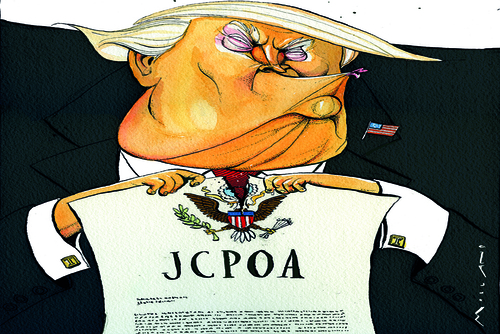
President Trump described Iran as a “rogue state” in his Sept. 19 speech at the United Nations, and said the Iran nuclear deal was “one of the worst and most one-sided transactions” America has ever signed, an “embarrassment” to America. On the same day, U.S. Secretary of State Rex Tillerson told the media that if America is to continue to fulfill the Iran nuclear deal, changes have to be made.
Washington has reignited the Iran nuclear controversy. When Iranian President Hassan Rouhani spoke at the United Nations on Sept. 20, he said, “It will be a great pity if this deal is destroyed by rogue newcomers to the world of politics.” Rouhani said Iran would decisively and firmly respond in kind. Trump has criticized the Iran nuclear deal since his campaign days, and he’s now turning his personal preferences into America’s national policies. The Iran nuclear deal is a product of compromise between Iran and the great powers. It is Trump’s impression that the deal does not guarantee Iran will give up its nuclear arms, or that it will permanently limit Iran’s nuclear development, so Trump wants out of the deal.
Yet, the Iran nuclear deal was signed by the five permanent members of the United Nations Security Council, plus Germany, with Iran, and was ratified by the U.N. Security Council; it is a classic multilateral international agreement. The American administration’s impulsive rejection of the deal’s validity and threats to unilaterally back out of it are out of line.
In less than a year since Trump became president, America has already left or threatened to leave multiple international agreements. Washington’s exit from the Paris Climate Agreement has severely damaged all the human efforts that have been made to preserve our environment. It has shown that the Trump administration will do whatever it wants to remain “America First.”
America also left the Trans-Pacific Partnership, and has asked to reopen negotiations on NAFTA and other trade agreements, such as those with South Korea. In the last year, Washington has undoubtedly set a record in the number of international agreements it has torn up or threatened to destroy. In America’s political language, “obeying international agreements” is still used to lecture some non-Western countries, but America is the biggest destroyer of all international rules.
Destroying trade agreements is one thing, since business negotiations are an easy thing to do, but the Paris climate agreement controls the environment, and the American exit is akin to deceiving the whole world and destroying the American image. America has damaged its reputation by trying to reap as many benefits as possible, because it shows that ultimately it’s all about American interests.
The Iran nuclear deal is different; the agreement is a cornerstone for the stability of the Gulf, or perhaps for a larger area. With the deal, the Middle East and the world gained more order over their control of nuclear nonproliferation; in destroying the deal, there’s more chaos, which will once again trigger uncertainty in the Middle East region.
How could a matter of this magnitude be overturned by a new administration? Where does this leave the credibility of a great power? Occurrences such as this used to happen only in countries that had experienced repeated coups and lacked law and order. This is not at all what the world expects from America.
If more countries follow America’s example by denying previously-signed international agreements, chaos will reign. The countries that are more globalized have the most to lose, and America is undoubtedly the most globalized of all. If America chooses to focus only on the short term, to reap its own national interests, it is shooting itself in the foot.
Now, when America calls Iran a “rogue nation,” and Iran calls America a “rogue newcomer,” Washington will learn there are fewer countries on its side. America’s recriminations of the Iran nuclear deal are certain to disturb the other five countries which signed the agreement, and unsettle even more.
America cannot indulge itself this much just because it is large and powerful; it cannot be the biggest challenger to the international order and the biggest source of unpredictability in the world. Washington needs to calm down. A restoration of American interests is not going to come from the reaping and looting of interests from outside American borders. America is better off forging ahead on real issues with solid footing.

Leave a Reply
You must be logged in to post a comment.